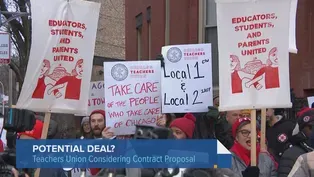
Trump Administration Reduces Illinois Public Health Funding by $400M
Clip: 3/31/2025 | 8m 35sVideo has Closed Captions
The public health funding Illinois receives from the federal government is about to be slashed.
Illinois' public health funding is set to take a hit as the Trump administration is pulling back on more than $400 million aimed at preventing infectious diseases and treating mental health and substance abuse issues.
Problems with Closed Captions? Closed Captioning Feedback
Problems with Closed Captions? Closed Captioning Feedback
Chicago Tonight is a local public television program presented by WTTW
WTTW video streaming support provided by members and sponsors.

Trump Administration Reduces Illinois Public Health Funding by $400M
Clip: 3/31/2025 | 8m 35sVideo has Closed Captions
Illinois' public health funding is set to take a hit as the Trump administration is pulling back on more than $400 million aimed at preventing infectious diseases and treating mental health and substance abuse issues.
Problems with Closed Captions? Closed Captioning Feedback
How to Watch Chicago Tonight
Chicago Tonight is available to stream on pbs.org and the free PBS App, available on iPhone, Apple TV, Android TV, Android smartphones, Amazon Fire TV, Amazon Fire Tablet, Roku, Samsung Smart TV, and Vizio.

WTTW News Explains
In this Emmy Award-winning series, WTTW News tackles your questions — big and small — about life in the Chicago area. Our video animations guide you through local government, city history, public utilities and everything in between.Providing Support for PBS.org
Learn Moreabout PBS online sponsorship>> Illinois's Public Health funding is set to take a hit.
State officials say the Trump administration is pulling back more than 400 million dollars aimed at preventing infectious disease and treating treating mental health and substance abuse issues.
The funding is part of roughly 1.8 billion dollars.
The state is expecting to receive from the federal government but remains in limbo.
Joining us now with more our DR, Kiran, Joshi interim chief operating officer of the Cook County Department of Public Health.
And Zoom, Doctor, Samir Vohra, director of the Illinois Department of Public Health Doctors.
Thanks to both for joining us.
Welcome back, DR I want to start with you, please.
What do budget cuts of this size mean for your department, especially when the state of Illinois is already facing a tight budget year.
>> It is something will create debilitating effects were the only Department of Public Health in our public health community across the state of Illinois, this funding an initially provided during the height of the COVID-19 pandemic was something that had continued, really, too.
Think about a few things.
Critical upgrades to our public health laboratories, improved technology to track infectious diseases, vaccination efforts.
And really, as we found out during the COVID-19 pandemic, our ability to lean into strategies to prepare for future emergencies.
All aspects that were provided for this federal funding money that was provided the state and or local health departments really to protect only residents from future and current public health emergencies.
>> Dr Joshi Cook County Health is losing to CDC Centers for Disease Control and Prevention grants totaling 31 million dollars.
What was that money to be used for?
>> Thanks, Brent is so these funds are absolutely critical productive or as comments.
We had one CDC grant that funded work around community health workers.
These are leave people who often come from the very communities they serve.
That is extremely vulnerable.
Communities in play a crucial role in sharing health information as well as providing us with an understanding of what's happening at the community level.
So really, really critical work Brandis the other grant was a larger CDC grant that funded a variety of different activities, including things like increasing rates of pediatric vaccinations.
I think it should be obvious to anyone who's watching at this time.
How important that is, particularly when we're seeing outbreak of measles.
That is affecting communities across the country.
>> Cook County released a behavioral health workforce shortage report back in October, finding the state of Illinois doesn't have enough providers available to prevent diagnose and treat mental health and substance use disorders.
How might these cuts impact the department's efforts to address some of that?
>> So behavioral health quite simply is public health and vice versa.
so it's quite ironic that we're sitting here talking about cuts to public health funding when that report very clearly articulated that we needed tens of thousands more behavioral health workers to bridge the gap that we're currently experiencing.
I mean, COVID really brought the behavioral health issues in our communities to light in a way that certainly we weren't aware of before.
>> Dr for the money was allocated for the next couple of years.
What is at risk without these funds and what recourse does the state have without them?
>> It is something that we knew sort of have the expectation of an the only apartment public health that we would have some more time to be able to spend this money thoughtfully and effectively.
Now we are in a different sort of unique challenge of how do we continue to prepare?
We have been very fortunate here in the state of Illinois through Governor Pritzker's leadership where state funding has been invested in R public health work.
But there's only so much that one state can do as we face these devastating federal challenges.
The Illinois Department of Public Health, our funding our last fiscal year.
25 budget at 65% of our funding coming from the federal government.
This is not unique to Illinois.
Many states have even more funding that comes from the federal government.
With these Very difficult for our state to work on it.
What I can say is that we hear the owner of Department of Public Health with our partners.
We use every single resource that we have available available to our mission of protecting the health of our residents today and preventing future challenges tomorrow.
>> One of the things Dr for that.
We've heard the White when making some of these cuts at the putt to the pandemic is over.
It's time for people to move on.
What do you say to that and how ready would you say the state is for the next public health emergency?
>> The COVID-19 pandemic.
Yes is over.
I think we're all very happy about that.
But I'd say COVID is still around.
We know that it's circulating in our communities and we know that the challenge was not just with COVID-19.
It was also soared in understanding.
How can our public health community be better prepared for future emergencies?
And that was something that we were continuing to spend this money very in partnership with the federal government using it effectively in ways that we could bolster our public health work.
Our labs are vaccination efforts.
Technology to help protect us from future emergencies.
We have very much in the Illinois Department of Public Health with our partners thinking about different strategies, including a COVID-19 after action plan that was released in May 2020 for the really talked about improving preparedness, modernizing our systems, improving our communications.
We continue to put all of our resources and efforts around that important effort of protecting the state in a residence for future emergencies.
But federal cuts like this.
We'll have debilitating of facts in order to make sure that we're using all of our optimal resources for that preparedness, Dr. Joshi opioid overdose deaths in Cook County.
You all been able to finally see some of a bit of a decrease.
They're continuing to decline from their peak in 2022.
>> Down to 1026 deaths last year.
What does the Department of Tribute this declined to?
>> Brandis.
There are a number of factors that are at play here.
I certainly think that the work that my colleagues at the Illinois Department of Public Health, the Chicago Department of Public Health and ourselves have done in terms of distributing naloxone.
He's certainly made a dent in what I can only characterize as a scourge.
Now, there's also a sense that we've gotten in talking with our partners that there could potentially also be changes happening in the drug supply.
So potentially less potent fentanyl, for example, being introduced in the drug during supply resulting in this downturn.
>> So it's less a matter of addressing folks who are are suffering addiction.
And that could be a number of factors that sounds like that are at play, including getting support to those folks who have addiction.
Absolutely.
That's right.
And in talking to our partners were also hearing just thought that it seems that more and more people are seeking treatment for addiction, which again, is why we really need to be thoughtful about strengthening our public health system, strengthening our behavioral health systems that's where we'll have to leave Thanks to the work that for the work
Chicago Teachers Near a Deal on Contract Proposal
Video has Closed Captions
A with the Chicago Teachers Union on a new contract is now in sight. (3m 30s)
How Postal Service Cuts Could Impact Illinois Residents
Video has Closed Captions
Local postal workers on the impact of cuts to the U.S. Postal Service. (8m 29s)
Providing Support for PBS.org
Learn Moreabout PBS online sponsorshipChicago Tonight is a local public television program presented by WTTW
WTTW video streaming support provided by members and sponsors.













